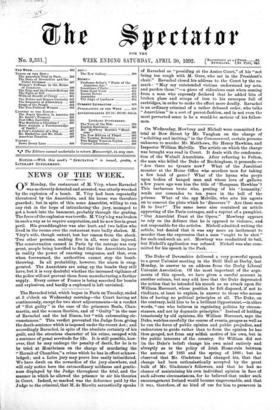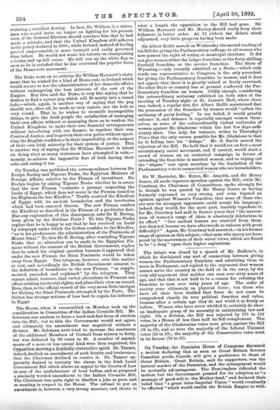The Duke of Devonshire delivered a very powerful speech to
a great Unionist meeting in the Drill Hall at Derby, last Monday, in answer to an address from the Derby Liberal Unionist Association. Of the most important of the argu- ments of this speech, we have given a careful account in another column, but may add here that the Duke deprecated the notion that he intended his speech as an attack upon Sir William Harcourt, whose position he felt disposed, if not to vindicate, at least to explain, in answer to those who accuse him of having no political principles at all. The Duke, on the contrary, held him to be a brilliant Opportunist,—in other words, " one who believes in regulating politics by circum- stances, and not by dogmatic principles." Instead of holding tenaciously by old opinions, Sir William Harcourt, says the Duke, watches carefully the course of events, gauges as well as he can the force of public opinion and public prejudice, and endeavours to guide rather than to form the opinion he has thus gauged, not from any selfish motive of his own, but in the public interests of the country. Sir William did not (in the Duke's belief) change his own mind entirely and abruptly as to the policy of Irish Home-rule between the autumn of 1885 and the spring of 1886; but he observed that Mr. Gladstone had changed his, that that change had been enthusiastically accepted by the great bulk of Mr. Gladstone's followers, and that he had no chance of maintaining his own individual opinion in face of such adverse circumstances, for he believed that under such encouragement Ireland would become ungovernable, and that it was, therefore, of no kind of use for him to persevere in
resisting a manifest destiny. In fact, Sir William is a states- man who would insist no longer on fighting for his present view, if the General Election should convince him that he had made a mistake, and that the United Kingdom still adheres to the policy declared in 1886 ; while Ireland, instead of having proved ungovernable, is more tranquil and easily governed than before. He would not waste his talents on championing a losing and up-hill cause. He will run up the white flag so soon as he is satisfied that he has overrated the popular force of the Home-rule movement.



















































 Previous page
Previous page